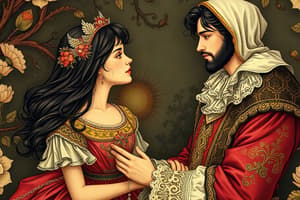Podcast
Questions and Answers
What leads to Romeo's decision to consume poison?
What leads to Romeo's decision to consume poison?
- He is overwhelmed by his family's feud.
- He receives a letter from Juliet.
- He seeks vengeance on Paris.
- He believes Juliet is truly dead. (correct)
Which theme is most evident in the description of Romeo and Juliet as 'star-crossed lovers'?
Which theme is most evident in the description of Romeo and Juliet as 'star-crossed lovers'?
- The inevitability of fate. (correct)
- The power of love conquering all.
- The consequences of family loyalty.
- The significance of choice and free will.
What distinguishes the final scene of Romeo and Juliet from the rest of the play?
What distinguishes the final scene of Romeo and Juliet from the rest of the play?
- The setting in a vibrant garden.
- The reconciliation of the Capulets and Montagues.
- The tragic miscommunication that leads to suicide. (correct)
- The lack of any character dialogue.
What creates dramatic irony in Romeo and Juliet?
What creates dramatic irony in Romeo and Juliet?
What is the ultimate consequence of the deaths of Romeo and Juliet?
What is the ultimate consequence of the deaths of Romeo and Juliet?
Flashcards are hidden until you start studying
Study Notes
Character Deaths
- Romeo: Consumes poison upon finding Juliet seemingly dead.
- Juliet: Wakes and, finding Romeo dead, stabs herself with his dagger.
- Paris: Killed by Romeo in a duel at Juliet's tomb.
- Lady Montague: Dies offstage, reportedly from grief over Romeo's banishment.
Themes of Fate
- The notion of stars and fate pervades the play, as characters often reference their destiny.
- Romeo and Juliet are described as "star-crossed lovers," indicating their doomed fate from the start.
- The concept of fate vs. free will is evident in their choices leading to tragedy.
Analysis of the Final Scene
- Set in the Capulet family tomb, the scene emphasizes the tragic miscommunication:
- Romeo believes Juliet is truly dead, leading to his suicide.
- Juliet awakens and finds Romeo dead, culminating in her suicide.
- The scene serves as a tragic culmination of love, loss, and misunderstanding, highlighting the consequences of familial conflict.
Dramatic Irony
- The audience knows that Juliet is not truly dead, but Romeo does not, creating tension.
- Characters' actions are driven by misinformation, underscoring the tragic elements of the story.
- The foreseen implications of events (i.e., the deaths) contrast sharply with the characters' lack of awareness.
Resolution and Consequences
- The deaths of Romeo and Juliet lead to the reconciliation of the Montagues and Capulets.
- Their tragic end serves as a bitter lesson on the consequences of feud and hatred.
- The play concludes with a somber reflection on the cost of conflict, as the families recognize their folly too late.
Character Deaths
- Romeo, believing Juliet to be dead, drinks poison to join her in death.
- Juliet, awakening to find Romeo dead, stabs herself with his dagger.
- Paris, a suitor of Juliet, is killed by Romeo in a duel at Juliet's tomb.
- Lady Montague dies offstage, presumably from grief over Romeo's banishment.
Themes of Fate
- The play frequently references the influence of destiny, notably through the "star-crossed lovers" phrase, which foreshadows their doomed romance.
- The characters' choices, while seemingly free, are often depicted as predestined.
- The play presents a complex interplay between fate and individual agency.
Analysis of the Final Scene
- The final scene, set in the Capulet tomb, highlights the devastating consequences of miscommunication and misunderstanding.
- Romeo's decision to take his life stemmed from his belief in Juliet's death.
- Upon waking to find Romeo deceased, Juliet's despair and anger culminated in her suicide.
- The tragic conclusion emphasizes the power of love, the weight of loss, and the devastating influence of family conflict.
- The scene highlights the play's exploration of human emotions and their role in shaping tragic outcomes.
Dramatic Irony
- The audience is aware of Juliet's faked death, while Romeo remains unaware, creating dramatic tension.
- Characters make crucial decisions based on misinformation, contributing to the play's tragic elements.
- The audience's foreknowledge of upcoming events contrasts with the characters' naivety, adding layers of depth and tragedy to the story.
Resolution and Consequences
- The deaths of Romeo and Juliet tragically bring about the reconciliation of the Montague and Capulet families.
- Their sacrifice serves as a stark lesson about the consequences of hatred and feud.
- The play concludes with a somber reflection on the cost of conflict, as the families recognize the futility of their rivalry after their children's deaths.
Studying That Suits You
Use AI to generate personalized quizzes and flashcards to suit your learning preferences.




